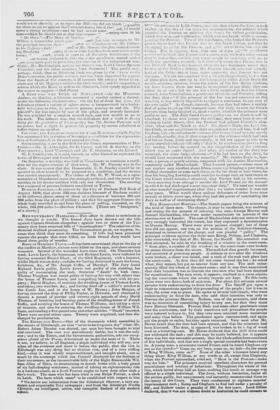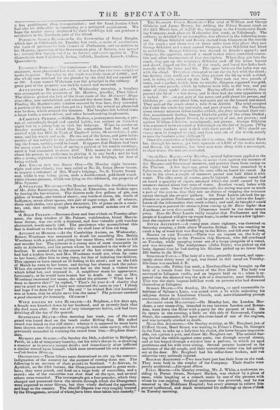against Captain Graham altogether ; against two or three of
the Yeo- manry they have returned bills of " manslaughter." The relatives of the deceased declined prosecuting. The Government go on, we suppose, be- cause they think they must do something. If bills had been presented against the people that were killed, an Irish Grand Jury would have found them guilty of murder.
RIOTS AT MERTHYR TYDVIL.—It has been ascertained, that on the day of the conflict at Merthyr, sixteen were killed on the spot, and about seventy wounded. Several of the wounded have since died. On Thursday last week, Lewis Lewis, the huntsman, and Richard Lewis, were indicted for having wounded Daniel Black, of the 93rd Regiment, with a bayonet, whilst Black was on duty ; and also for having destroyed in part the house, furniture, &c., of Mr. Joseph Coffin, of Merthyr. The Jury found Richard Lewis guilty, Lewis Lewis not guilty of the stabbing, but guilty of encouraging the mob. Sentence " death" in both cases. Thomas Vaughan was found guilty of forcing his way with others into the house of Thomas Lewis, and compelling him to part with his pro- perty ; David Hughes, of entering the dwelling-house of Thomas Lewis, and taking two watches, &c., and having fired off a soldier's musket at the Castle Inn, and at the house of W. Bryant ; John Morgan, of having entered the shop of Philip Taylor, at Hirwain, and obtained by threats a pound of powder and twenty-eight pounds of shot; David Thomas, of breaking and burning parts of the dwelling-house of Joseph Coffin, and entering the house of Thomas Williams, and taking a chest of drawers, and also for entering the dwelling-house of 'William Wil- liams, and stealing a five-pound note and other articles. " Death" recorded. There were several minor cases. Twenty were acquitted, and four dis- charged by proclamation. THE EDINBURA411 RIOTS.—Out of the thousands which assembled in the streets of Edinburgh, on that "ne'er-to-be-forgotten day" when Mr. Robert Adam Dundas was elected, one man has been brought to trial and convicted. The case was marvellously feeble, but it was the only one ; and so the Tories, and the Government authorities, who are every. where afraid of the Tories, determined to make the most of it. There is not, we believe, in all England, a single individual who will say, now when all the evidence and more is before the public, that the riot in Edinburgh was any thing but an election riot, and of a very trifling hind,—that it was wholly unpremeditated, and brought about, not so much by the contempt which the Council displayed for the feelings of their townsmen, as the inconceivable folly of the Right Honourable Wil- liam Allan of Glen,. in determining to march home with a body guard of six half-sleeping watchmen, instead of taking an eighteenpenny ride in, a hackney-coach, as a Lord Provost ought to have done after such a day's work. The man who has been tried is one Ralph Forster, a clerk in-'Leith. The facts which seem* to be established with respect to him .4*We derive our information from the Edinburgh Observer, a very mo- derate and respectable Tory newspaper ; and from the Edinburgh Weekly Ore/tide, an intelligent, active, and energetic Radical of the modern school.. are—, ets presence.in Leith Street, near the shop edicre the Leovest took shelter oil the day of the riot ; his asi.ompaiiving. the military which guarded the Provost on quitting the shop ; his violent gestic:dation,
which was seen, and vociferation, which was net heard, while so accom- panying the Provost. Two of the watchmen, who formed the Provost's
pent, swore hard that Forster was oil the North Midge, antittl_tealtuehne attempt:2:1 the Provost, and out to heave him aver the bridge. Bat it appears, first, that one of these iit;::::!elie Se' 1
swears point-!:lank that Forster hall a green cont, while the miter swears that he had a blue,—which fact alone would he suelcient, 7e '1; us, to
settle the question ; secondly, it is distiemly ssvorn that Forster w:ts iri
the Debtors' Gaol at the moment when the two watchmen swear that he wes on tile Bridge ; thirdly, the Provost himself, who had actually' hold of the Bridge Street hero, states esmrtesle, that Forster was not
the man. We are net surprised that a Setteli Judge shouhl, in the face of these plain facts, suns up in the lunge:me iu witicli Judge Boyle did
on this occasion, because, to use the words of the late Heavy Erskine, v-e have known them too long to be surprised at any thing they can either do or say ; but we are not a little surprised to find the Crown
counsel, John Cunningham, a gentleman of talents and liberality, telling the Jure that—" if the prisoner at the bar was not convicted On this occasion, it was utterly impossible to expect a convictien in any case of the sort again." As though, forsooth, because they had taken a mighty deal of pains to get up this trumpery case. the Jury, to save the Crown- lawyers from beim-, laughed at, must convict, whether the prisoner were guilty or not. The Jury found Forster guilty—as we think it will be- admitted, by those who peruse the evidence, they must have done—of rioting in Leith Street, after the Provost had quitted Christie's shop.. Now, what said the Bench to this? Mr. Justi, Boyle, the Lord Jus- tice Clerk, as our neighbours in their magnificent svey call him, had told
the Jury, hefore he err 1 cred on the evidence, that he was Lomat to state openly and undisguisedly, that if they attended to the evidence which had been laid before them, fairly and impartially, it did not appear to him to be a case attended with any difficulty:" that is, lie was bound to give the Jury his verdict,. before be entered on the recapitulation of the evidence which was to guide theirs! And when the verdict of the Jury was returned, the same Judge observed—" Hite had been on the Jury, he should have concurred with the minority." Mr. Justice Boyle is, how- ever, a person of gentle address, compared with Mr. Justice Maconochie, commonly called Meadoivbank. That learned person,—whom some of
our readers may recollect about fifteen years ago bringing a poor man, a Radical shoemaker or some such thing, to the bar three or four times, ge-
fore his bungling Lordship could contrive to shape such an indictment as the Court would sustain,—observed, that Forster bad, in his opinion, "been accessary to an attempt to murder the Lord Provost for the manner in which he had discharged a most important duty." We need not wonder at nine months' imprisonment after this ; we rather wonder it was not nine years. What would these zealous defenders of order have done twenty or thirty years ago, when they had the power of nominating the Jury as well as of instructing them ?
Tna RADDINGTON RscrreaseL-The Scotch papers bring the account of the trial of these men. The charge, it may be recollected, was mobbing and rioting for the purpose of rescuing two men, George Murray and
Samuel Maclauchlan, who were- under examination on account of the election-row at Lauder. The case of Maclauchlan does not seem to have very strongly interested the rioters, but they expressed a determination to liberate Murray. There were seven persons charged ; but of these two did not appear, one was, on the motion of the Solicitor-General,_
dismissed as-innocent of the charge, and one pleaded " guilty." The principal evidence against the three men Kemp, Neilson, and Cleghorn, who were tried, was that of Mr. Horne, the Sheriff. His attention was
first attracted, he said, by the breaking of a window in the court-room. " Soon after, a number of the windows in the court-room were broken-
by stones thrown from the street. The mob had then greatly increased,
and consisted-of grown-up people. A minute or two after the windows• were broken, a shout was raised, and a rush of the mob took place into
the court-room. At first they did not come beyond the bar ; be asked what they meant, but got no answer from any one. The mob subse-• quently filled the whole of the court-room ; and it was then ascertained that their intention was to liberate the two men who had been detained for examination. The men were, it. appears, confined in a room adjoin_ ing the court-room where the county records are kept. To this room. there were two doors, both of cast-iron. For about five minutes several
persons were endeavouring to force the door. The Sheriff got upon a chair to remonstrate against this proceeding of the people ;. but it was in
vain, the noise was so great. He spoke to several individuals, who were endeavouring to force the door, who said their intention was only to liberate the prisoner Murray. Neilson, one of the prisoners, said there was no intention of committing injury to any one, but that they must.
have Murray liberated. Provost Dods and some other gentlemen came• into the court-room, and by their exertions and persuasions the people- were induced to leave it; but they very soon returned more numerous and noisy than before. The gentlemen again remonstrated, and again got the people to retire, but they again returned. Very. soon after Mr. Horne heard that the door had beenopened, and that the prisoners had been liberated. The door, it appeared, was broken in by a log of wood• used as a battering-ram. Mr. Horne declared that the civil tbrce could not withstand the mob ; and this may be easily believed, for it appears. there was but one constable present,. that the whole police force consisted of five individuals, and that not a single special constable had been sworn in. A young man, a procurator named Fraser, said he heard Cleghorn cry out to the crowd—" Come on, my boys, come on, may lads—In the name of King William, come on!" None of the other witnesses heard any thing about King William, or any words at all,. except that Cleghorn, when the Provost approached, cried out, " Here is the Provost—make way for him." The prisoners received excellent characters for general. peacefulness and sobriety of behaviour. Throughout the whole of the riot, which lasted about half an hour, nothing like insult or outrage was offered to a single individual. The Jury, without hesitation, found all the parties guilty, but unanimously and earnestly recommended them to the mercy of the Court. They were condemned to eighteen months' imprisonment each.; Kemp and Cleghorn to find bail under a penalty of 601., and Neilson under a penalty of 301. for five years. Lord Gullies declared, that it was not without. doubt or hesitation he could consent.ta
a less punishment than transportation ; and the Lord Justice Clerk
had also his in consenting to a mitigated punishment. We hope the tender mere., displayed by their Lordships will not produce a revolution in the Northern part of the island.
PATRIOTIC Scorcu But:cals.—In the Convention of Royal Burghs, which met at Edinburgh on 'Tuesday last week, a series of resolutions, the basis of petitions to both :blouses of Parliament, and an address to his Majesty, approving of the Government plan of Reform, was agreed to : twenty-five lotr;41is voted in its favour. and seven against it The
dissentients were Irvine, Selkirk, Renfrew, Lanark, Cullen, Queensferry.



























 Previous page
Previous page